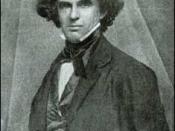Nathaniel Hawthorne is one of Americas best known writers. Although his works are considered some of the greatest pieces of American literature, Hawthorne is often considered a misogynist. Websters Dictionary defines misogyny as "a hatred of women." Many of Hawthorne's stories such as "The Birth Mark" have negative events which occur too female characters, but only to create the plot of the story. One [I] feels that Hawthorne may use females in bad situations to create suspense to a story, but he does not hate them.
"The Birth Mark" depicts how one might assume Hawthorne is a misogynist. The story is about a selfish man [Aylmer] who refuses to accept his wife [Georgiana] due to a birth mark on her face. Aylmer sees the birth mark "As being the visible mark of earthy imperfection" (Hawthorne 1290). Aylmer goes as far as removing the birth mark from Georgiana's face, and accidentally kills her.
Although Georgiana is killed, the negative views in the story are not aimed at Georgiana, instead they are directed towards Aylmer and his selfishness. Aylmer tries to remove the one imperfection from his wife's face and "As the last crimson tint of the birth-mark- that sole token of human imperfection- faded from her cheek, the parting breath of the now perfect woman passed into the atmosphere" (Hawthorne 1300). Many critics see a female being killed and narrowmindedly miss the fact that her misfortune is used to bring out the selfishness in within Aylmer. Although a female dies in "The Birth Mark," Hawthorne is not negative towards women, and does not hate them.
In conclusion one feels that critics often do not take into account every detail of Hawthorne's works. "The Birth Mark" is not a story of hatred towards women,


